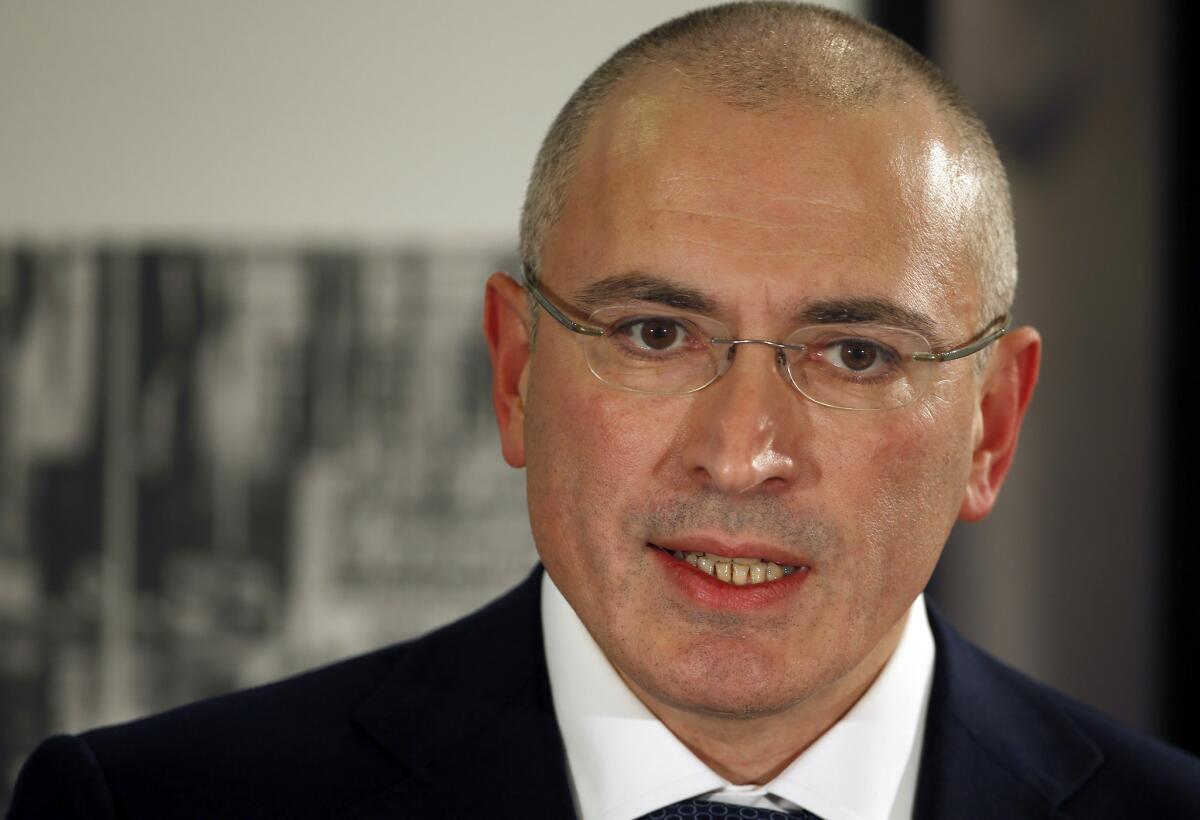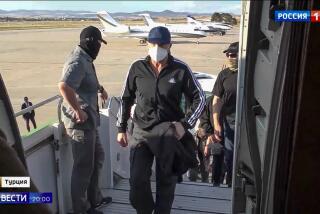Khodorkovsky: For now, steering clear of Russia and politics

- Share via
MOSCOW -- Mikhail Khodorkovsky, the former oil tycoon once considered President Vladimir Putin’s most potent political foe, said Sunday that he had no plans to resume his business or political activities or to support Russia’s embattled opposition forces.
In a televised interview from Berlin, where he was whisked Friday after his release from prison, Khodorkovsky also said he has no plans to return to Russia in the near future. He gave little hint of what his future holds other than to say he would remain in Germany for now while his mother undergoes medical treatment there.
“I am not engaging in business as it doesn’t interest me,” said the former oligarch, who was Russia’s richest man when he was thrown in prison more than 10 years ago. “I am not getting involved in politics in terms of struggling for power, but it would be strange to expect me not to engage in social activities.”
He spoke in an interview at a Berlin hotel with TV Rain [link in Russian], a private, liberal-leaning Russian television network. “Really now I will be busy resolving only family matters and if someone expects me ... [to] be sponsoring the opposition, this should be forgotten, this will not be. From neither a financial nor a practical point of view do I have either a possibility or a desire to get involved in it now.”
The interview was followed by two news conferences at the Checkpoint Charlie Museum, at the site of the iconic Cold War crossing point between East and West Berlin. It seemed appropriate, given that Khodorkovsky reached Berlin in a secret airlift that had all the elements of a 1960s spy handover.
Khodorkovsky, who had been held in the Segheza labor camp in the northern region of Karelia, said he was awakened by a prison warden hours after Putin’s surprise announcement Thursday that he planned to grant clemency to his onetime archenemy. The warden told him that he was “going home,” he said at the second, larger news conference.
Apparently unbeknownst to him as well as his family and lawyers, former German Foreign Minister Hans-Dietrich Genscher had arranged for a private jet to pick him up.
“It was only in transit that I found out that I was going to Berlin, when my guards left and the plane door was closed,” Khodorkovsky said. “Only when the plane landed in Berlin I realized I was free.”
Once there, he was reunited with his parents and an older son and daughter. His wife and two younger, twin sons are reportedly in Switzerland.
The former chief executive of the giant Yukos oil company, Khodorkovsky was arrested in 2003 and subsequently convicted in 2005 and in 2010 on charges of fraud, tax evasion and money laundering. The case was widely seen as politically motivated and considered a turning point in Putin’s path toward authoritarianism in Russia.
Although Khodorkovsky’s prison term was due to expire in August 2014, Russian prosecutors had said recently that they were investigating new charges against him, suggesting that he could have remained in prison indefinitely.
Although Putin, in announcing his decision to grant clemency, hinted that the new case would not be pursued, Khodorkovsky said in the interview that he was afraid to come back to Russia in the near future because a $500-million damage claim from his first trial still remained in force and “upon my return I might not be able to go back” to Germany, where his mother has reportedly been under treatment for cancer.
Khodorkovsky thanked many people for assisting in his release, including Genscher and German Chancellor Angela Merkel. However, he said that while he was “glad” that Putin had pardoned him, he did not express gratitude to the Russian leader, rather implying that Putin was personally responsible for his imprisonment and for destroying Yukos, which was driven into insolvency by the government.
“Putin has been thinking over my release for over 10 years,” he said. “I don’t review [our] confrontation too emotionally. My attitude is pragmatic, and pragmatism doesn’t call for either hatred or vengeance.”
“If it was beneficial for Putin to take this decision now, and it is beneficial for me, then it is a win-win situation, which is always good,” Khodorkovsky added.
In his two letters to Putin, one a formal clemency appeal and the other a personal one explaining his reasons, he never admitted his guilt, Khodorkovsky said. He added that he wouldn’t have said anything that would have implicated his co-defendants from Yukos, who are still languishing in prison: co-owner Platon Lebedev, who is due for release in April, and the company’s former security chief, Alexei Pichugin, who is serving a life sentence for allegedly organizing four contract killings. Both are regarded as political prisoners by rights groups.
“I couldn’t act like this toward those people who are innocent,” Khodorkovsky said, adding that he would continue to fight for their release.
Political experts in Russia offered divergent views on whether Putin gained more than he lost by releasing Khodorkovsky -- whose pardon was the last of several conciliatory year-end acts by the president, who may be trying to soften criticism of his government before the Winter Olympics in Sochi begin in February.
“Granting freedom to Mikhail Khodorkovsky ... is certainly a big political achievement for President Putin,” Dmitry Orlov, general director of the Agency for Political and Economic Communication, a Moscow-based think tank, said in an interview. “The fact that Khodorkovsky publicly pledged not to participate in the political struggle in Russia, not to sponsor the opposition, not to claim back his lost assets and not to return to Russia in the near future is certainly a very good message both for Russia and Vladimir Putin, especially on the eve of the Sochi Olympics.”
But Lilia Shevtsova, a senior researcher with Moscow Carnegie Center said, it was Khodorkovsky who emerged as the “moral winner” in the decade-long confrontation with Putin.
“It is quite obvious that Putin ordered this special operation to free Khodorkovsky and kick him out of the country to pursue his own political agenda, primarily connected with the coming Olympic Games and with Russia hosting a G-8 Summit next year,” Shevtsova said in an interview. “At the same time, he also wanted to resolve his personal conflict with Khodorkovsky by humiliating him with a clemency act. However Khodorkovsky refused to admit his guilt and he still remains Putin’s biggest political opponent in Russia whom Putin failed to crush.”
More to Read
Sign up for Essential California
The most important California stories and recommendations in your inbox every morning.
You may occasionally receive promotional content from the Los Angeles Times.













